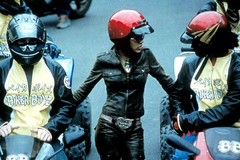|
Newest Reviews:
New Movies -
The Tunnel
V/H/S
The Tall Man
Mama Africa
Detention
Brake
Ted
Tomboy
Brownian Movement
Last Ride
[Rec]³: Genesis
Hara-Kiri: Death of a Samurai
Indie Game: The Movie
Abraham Lincoln: Vampire Hunter
Old Movies -
Touki Bouki: The Journey of the Hyena
Drums Along the Mohawk
The Chase
The Heiress
Show
People
The Strange Affair of Uncle Harry
Pitfall
Driftwood
Miracle Mile
The Great Flamarion
Dark Habits
Archives -
Recap: 2000,
2001, 2002,
2003, 2004
, 2005, 2006,
2007 , 2008
, 2009 ,
2010 , 2011 ,
2012
All reviews alphabetically
All reviews by star rating
All reviews by release year
Masterpieces
Screening Log
Links
FAQ
E-mail me
HOME
| |
Biker Boyz (Reggie Rock Bythewood, 2003)
 A surprisingly ambivalent entry in genre
that’s usually brain-dead, Reggie Rock Bythewood’s Biker
Boyz mines intelligence by recognizing the contradictions inherent in its
milieu. Take for example the scene in which Kid's (Derek Luke) mother disproves
when her younger son plays a violent videogame and then uses that same game as
an opportunity to bond with her older son. This inherently conflicted approach
to the violent or sexist modes of expression that permeate throughout this
particular world is present in almost every one of the movie’s scenes. For
example, in one subplot demonstrating an askew brand of affection mixed with
domination a man tells his paramour that he wants to brand her with a tattoo. In
another scene, characters suppress their views on sexual exploitation to
participate in a bikini bike wash because it’s “for charity”. Later we
find that a mother has put up with her husband’s infidelity for years, in an
attempt to hold her family together. Quite explicitly, the tensions that exist
in Biker Boyz place the needs of the
community at odds with one’s individual values and the needs of one’s desire
to be civilized with the need to express more primal masculine impulses.
Obviously, considering the movie’s subject matter, most of the observations on
how culture functions as an extension of and an opponent of the individual's
desires can be found by examining how the motorcycle racing subculture exerts
itself on those who subscribe to it. Both as a support structure (demonstrated
through displays of male respect and more practical, real world gestures, such
as when Smoke offers financial assistance to Kid’s family at his father’s
funeral) and a code of honor, this supposedly shifty subculture provides
obvious, yet self-serving, benefits to its subscribers. A surprisingly ambivalent entry in genre
that’s usually brain-dead, Reggie Rock Bythewood’s Biker
Boyz mines intelligence by recognizing the contradictions inherent in its
milieu. Take for example the scene in which Kid's (Derek Luke) mother disproves
when her younger son plays a violent videogame and then uses that same game as
an opportunity to bond with her older son. This inherently conflicted approach
to the violent or sexist modes of expression that permeate throughout this
particular world is present in almost every one of the movie’s scenes. For
example, in one subplot demonstrating an askew brand of affection mixed with
domination a man tells his paramour that he wants to brand her with a tattoo. In
another scene, characters suppress their views on sexual exploitation to
participate in a bikini bike wash because it’s “for charity”. Later we
find that a mother has put up with her husband’s infidelity for years, in an
attempt to hold her family together. Quite explicitly, the tensions that exist
in Biker Boyz place the needs of the
community at odds with one’s individual values and the needs of one’s desire
to be civilized with the need to express more primal masculine impulses.
Obviously, considering the movie’s subject matter, most of the observations on
how culture functions as an extension of and an opponent of the individual's
desires can be found by examining how the motorcycle racing subculture exerts
itself on those who subscribe to it. Both as a support structure (demonstrated
through displays of male respect and more practical, real world gestures, such
as when Smoke offers financial assistance to Kid’s family at his father’s
funeral) and a code of honor, this supposedly shifty subculture provides
obvious, yet self-serving, benefits to its subscribers.
 The characters in Biker
Boyz are aware that their behavior is somewhat unhealthy or dangerous, but
at the same time recognize the purpose it serves. Upon a cursory examination,
the movie doesn’t really seem to be questioning why it is that such posturing
with big engines and bigger egos is necessary in the first place. The style
creates an atmosphere so striking that the audience can see the attractive
aspects of this lifestyle. It eventually becomes apparent why a group of young
men struggling to define themselves might come to define themselves in this way.
In the racing movie genre, displays of machismo become aesthetic objects, and
ideally expressive ones, which reveal the interior lives of the characters (this
is most exemplified here by the glorious, yet sacrificial pose that the riders
make as they cross the finish line). As such, the genre becomes a perfect arena
to address real-world issues of male identity (by locating the climactic race on
a dude ranch, the film acknowledges that the Western genre served this purpose
in the past). It is precisely because the world the movie shows makes it
permissible for men to demonstrate their normally unspoken masculinity that it
attracts them in the first place. Kid’s tattoo, which reads “Burn Rubber,
Not Your Soul” speaks this message plainly. The biker gangs, whatever risks
joining them might entail, provide an outlet for an inherent impulse that the
riders need to, but paradoxically can’t, convey. The characters in Biker
Boyz are aware that their behavior is somewhat unhealthy or dangerous, but
at the same time recognize the purpose it serves. Upon a cursory examination,
the movie doesn’t really seem to be questioning why it is that such posturing
with big engines and bigger egos is necessary in the first place. The style
creates an atmosphere so striking that the audience can see the attractive
aspects of this lifestyle. It eventually becomes apparent why a group of young
men struggling to define themselves might come to define themselves in this way.
In the racing movie genre, displays of machismo become aesthetic objects, and
ideally expressive ones, which reveal the interior lives of the characters (this
is most exemplified here by the glorious, yet sacrificial pose that the riders
make as they cross the finish line). As such, the genre becomes a perfect arena
to address real-world issues of male identity (by locating the climactic race on
a dude ranch, the film acknowledges that the Western genre served this purpose
in the past). It is precisely because the world the movie shows makes it
permissible for men to demonstrate their normally unspoken masculinity that it
attracts them in the first place. Kid’s tattoo, which reads “Burn Rubber,
Not Your Soul” speaks this message plainly. The biker gangs, whatever risks
joining them might entail, provide an outlet for an inherent impulse that the
riders need to, but paradoxically can’t, convey.
66
Jeremy Heilman
11-13-03
|